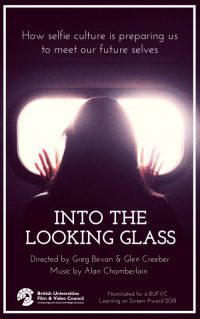
March 12, 2018, by jicke
The science of music brought to the big screen
Music is an integral part of any film, and research into computer generated music has been used to create the soundtrack for a film that has been nominated for a British Universities Film & Video Council (BUFVC) Learning Screen Award.
Engaging experience
The soundtrack for the film; ‘Into the Looking Glass – how selfie culture is preparing us to meet our future selves’ was created by Dr Alan Chamberlain who worked with Dr Greg Bevan and Dr Glen Creeber at the Department of Theatre Film and Television, Aberystwyth University, who wrote and directed the film.
The film asks the viewer to re-think their evolving relationship with the media, encouraging them to consider a future where agency will be enhanced by the spectator’s gradual movement towards the screen. Rather than simply illustrate the script, the selected audio-visual materials attempt to offer a more engaging experience for the viewer by responding to and entering into dialogue with the spoken text.
Numbers into Notes
Dr Chamberlain, who is based in the Mixed Reality Lab, has worked with Professor David De Roure from the University of Oxford to develop a software to experiment the area of digital humanities that allows people to explore computer algorithms in a creative way. The tools developed were called “Numbers into Notes” and was a software-based interpretation of Ada Lovelace’s theorizing on the properties of Charles Babbage’s Analytical Engine, she writes “the engine might compose elaborate and scientific pieces of music”.
The research explores the use of autonomous systems for composing music, an idea that stemmed from self-driving cars, Dr Chamberlain said: “I’d read a lot about self-driving cars and wanted to explore this in terms of music creation. I’ve been working with David to understand and develop ways that people can explore, re-use and experiment with materials from the humanities in creative ways.”
Using the Numbers into Notes interface the composer is able to create a musical algorithm (set of notes) by experimenting with the different mathematical formulae. The musical sequences can then be used for inspiration, or used directly in compositions.
Understanding value and impact
Dr Chamberlain continues: “Sometimes research can be difficult to explain, but by showing how unique tools such as Numbers into Notes can be used people can understand where the research has come from, it’s value and the innovative and impactful ways in which research can be applied in the real world, such as composing soundtracks for film”
This research is part of the EPSRC’s Fusing Audio and Semantic Technologies for Intelligent Music Productions and Consumption (FAST). This project brings the very latest technologies together on the entire recorded music industry form producer to consumer, making the production process more fruitful, the consumption process more engaging and the delivery and intermediation more automated and robust. io and Semantic Technologies for Intelligent Music Production anonsumption
Dr Chamberlain concludes: “The University of Nottingham has a long tradition of developing world leading research in the Arts and Sciences, this research has emerged from multi-disciplinary collaborations and an openness to explore new idea and push at the boundaries of what is possible. It’s important to see the way in which academia, the UK Government and UK Research Councils are valuing the creative industries and multidisciplinary working, as evidenced by the success of this project.”
The Award Ceremony is at the British Film Institute on Thursday 26 April 2018 at the BFI Southbank, London
No comments yet, fill out a comment to be the first

Leave a Reply